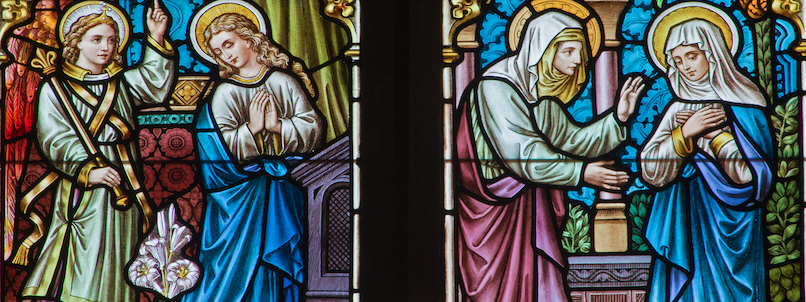By Mark Scott
 Few things feel as good as affirmation. Is this because we are so insecure or our self-esteem is so poor? Or is it because we rightfully long for proper affirmation? While in Israel this past summer, our tour group affirmed our tour guide, Mike, at the Garden Tomb. Alan Ahlgrim spoke words of affirmation and blessing over Mike for providing such a good tour for us. Alan said, “To speak of mere words is to speak of mere dynamite.” Indeed, speaking words of affirmation is a powerful thing. What could be more significant than “making firm” the promise of the Messiah? In our lesson today Elizabeth affirmed Mary, and Mary magnified God.
Few things feel as good as affirmation. Is this because we are so insecure or our self-esteem is so poor? Or is it because we rightfully long for proper affirmation? While in Israel this past summer, our tour group affirmed our tour guide, Mike, at the Garden Tomb. Alan Ahlgrim spoke words of affirmation and blessing over Mike for providing such a good tour for us. Alan said, “To speak of mere words is to speak of mere dynamite.” Indeed, speaking words of affirmation is a powerful thing. What could be more significant than “making firm” the promise of the Messiah? In our lesson today Elizabeth affirmed Mary, and Mary magnified God.
Blessing Mary
Luke 1:39-49
The story line in this week’s lesson picks up from where we left last week. Mary embraced God’s plan for her life, and then Gabriel departed. Then Mary departed. Excitement no doubt motivated her to go with haste to the south from Nazareth. Zechariah and Elizabeth lived in Judea (and according to tradition, probably fairly close to Jerusalem). When Mary arrived and greeted Elizabeth (no doubt a typical Middle Eastern greeting with a kiss to each cheek, which paid respect), three things suddenly happened: 1—John the Baptist leaped (skipped) in Elizabeth’s womb; it’s mentioned twice in our text, and the timing of the skip is probably the significant part. 2—Elizabeth spoke by divine inspiration (she was filled with the Holy Spirit). 3—Elizabeth affirmed Mary as the mother of “her” Lord.
Elizabeth blessed Mary. In fact, she pulled out all the stops. Elizabeth used both major words for blessing, and she blessed Mary in a loud voice. Did Elizabeth go overboard? She referred to Mary as the mother of my Lord. Our Catholic friends have probably venerated Mary too far. But perhaps our Protestant friends have not honored Mary sufficiently. Elizabeth blessed Mary. She “spoke well of her” (eulogeo) and “congratulated” her (makarios) on helping bring about the promise of the Messiah. Elizabeth understood that she had been favored by Mary’s coming. Verse 45 makes it clear that even though Elizabeth blessed Mary, she realized that God was the hero of the story by fulfilling his promise.
Mary also recognized her blessings. Her heart was full as she gave her Magnificat (Latin for “magnify”). In powerful poetry and in wording that draws a bead on many Old Testament concepts, Mary glorifies the Lord and rejoices in God. Her whole being was caught up in this divinely inspired moment. Notice the parallelism between her soul and her spirit. Mary recognized that she was just God’s humble servant, but she also realized that she would receive some recognition for what God was doing in her life. He, after all, is the Mighty One and holy is his name.
Glorifying God
Luke 1:50-56
Mary knew that she had been blessed beyond measure, and four verses underline that fact (46-49). However, six verses are not about Mary at all; they are about God (50-55). Mary glorified God for eight things which are rich in their Old Testament allusions to God’s deeds and sound very similar to Hannah’s prayer in 1 Samuel 2:1-10.
First, Mary glorified God for his mercy. This is especially important when we feel helpless. Mary noted that God extends this to those who fear him, from generation to generation. She closed her Magnificat with a similar wording about God’s merciful promise to Abraham and his descendants forever. Second, she recognized that God had performed mighty deeds with his arm. Arm is a symbol of his power. Third, God had scattered those who are proud. These were people who had an elevated view of themselves. Fourth, the perfect candidates for this arrogance were the rulers which God would bring down.
Fifth, in contrast to the arrogant rulers, God would lift up the humble (those who are lowly of mind). Sixth, God would fill the hungry with good things. He has always had a heart for the poor. Seventh, in contrast to the hungry, God would send the rich away empty. God’s economy is different from ours (Luke 16:19-31). Finally, God would help his servant Israel.
God’s mercy is the quality that gives rise to his deeds. These deeds look backward to the miracles in Egypt and forward to the wonders of Jesus. God gave Mary and Elizabeth three months together to dwell upon the affirmation of his promise through the babies in their respective wombs.
Dr. Mark Scott teaches Preaching and New Testament at Ozark Christian College in Joplin, Missouri.
Based on International Sunday School Lesson, © 2012, by the Lesson Committee. Scripture quotations are from the New International Version ©2011, unless otherwise indicated.
As you apply today’s Scripture study to everyday life, read Engage Your Faith by David Faust and the correlating Evaluation Questions.



Comments: no replies